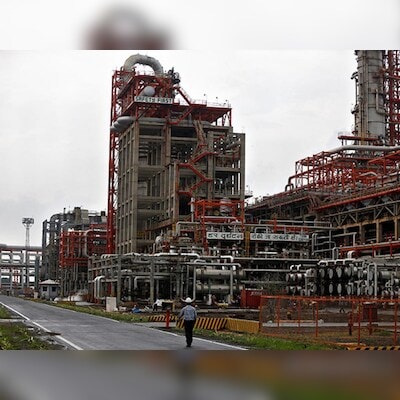Essar Future Energy, part of EET, will develop 1 gigawatt of hydrogen capacity. | Photo: Rediff Money
Essar Group will turn the UK’s Stanlow refinery into the world’s first decarbonised green refinery as it plans to use blue hydrogen to meet the unit’s heating and power needs, reducing carbon emissions by up to 95 per cent, it said. on Tuesday a senior official.
Speaking at the FT’s India Energy Transition Summit, Prashant Ruia, director of Essar Capital, which manages the group’s investment portfolio, said Essar Energy Transition’s (EET) HyNet project will produce 350 megawatts of blue hydrogen in phase 1 and another 1 gigawatt in phase-II.
Click here to connect with us on WhatsApp
Since the UK has no solar and wind potential to produce renewable electricity that could be used to split water in an electrolyser to produce green hydrogen and oxygen, EET will use natural gas to produce blue hydrogen and will also capture and permanently store the carbon produced during I process it.
“We are going to make this (Stanlow) the world’s first decarbonized green refinery. We are decarbonizing 95 percent of our carbon dioxide (CO2) emissions” that are released when crude oil is processed into fuels such as gasoline and gasoline. diesel, he said.
The use of blue hydrogen in the refinery process will decarbonize up to 2.5 million tons of CO2, which is equivalent to taking 1.1 million cars off the roads.
“The use of hydrogen for heating and refinery energy needs will be a world first,” he said.
Last week, the UK government announced funding of £21.7bn over 25 years to support the construction of two carbon capture clusters in the north of England including large blue hydrogen projects. The money will go to the HyNet center in Merseyside and the East Coast Cluster centers in Teesside, which will store more than 8.5 million tonnes of carbon dioxide a year under the Irish Sea and North Sea.
EET is piloting the HyNet project.
Decarbonizing the refinery would improve its profitability as the company would no longer have to pay carbon taxes, he said.
In addition to decarbonizing its oil refinery in the United Kingdom, the conglomerate, which became debt-free in 2022, is looking to build a green steel plant in Saudi Arabia and build an electric and LNG ecosystem to decarbonize heavy-duty long-haul trucks .
Essar Future Energy, part of EET, will develop 1 gigawatt of hydrogen capacity along with an associated green molecules capacity of 1 million tonnes per annum in Jamnagar, Gujarat, over the next four years.
In the area of green mobility solutions, Essar is focused on building an electric and LNG ecosystem to decarbonize long-haul heavy trucks, contributing to a cleaner transportation sector, Ruia said.
It has a fleet of 500 LNG-powered trucks that are used by different industries for their logistics needs, he said, adding that the plan is to add 20,000 to 30,000 trucks in a few years.
Trucks are the most polluting on the roads and produce about 110 tons of carbon dioxide per truck. There are 4 million trucks in the country and this number is expected to double in the near future.
Replacing diesel in trucks with LNG helps reduce CO2 emissions by 30 to 35 percent. Additionally, the gas does not produce nitrogen oxides (NOx) or sulfur oxides (SOx), which cause acid rain and air pollution.
The 4 million trucks emit 400 million tonnes of CO2, accounting for 18 per cent of India’s carbon emissions, it said.
In addition, the group also has a fleet of electric trucks.
Emissions from electric vehicles are zero.
Essar is also building a retail network to supply liquefied natural gas (LNG) to trucks, he said, adding that LNG-powered trucks can travel 1,400 kilometers on a full tank, while electric trucks have a range of around 150 kilometers. kilometers.
“So the short range is electric and the longer range can be LNG,” he said.
Essar had previously stated that it plans to invest $3.6 billion to decarbonize its Stanlow refinery in the United Kingdom and another $4 billion to establish a green steel plant, which will use hydrogen, in Saudi Arabia.
(Only the title and image of this report may have been modified by Business Standard staff; the rest of the content is auto-generated from a syndicated feed.)
First published: October 8, 2024 | 23:53 IS
Disclaimer:
The information contained in this post is for general information purposes only. We make no representations or warranties of any kind, express or implied, about the completeness, accuracy, reliability, suitability or availability with respect to the website or the information, products, services, or related graphics contained on the post for any purpose.
We respect the intellectual property rights of content creators. If you are the owner of any material featured on our website and have concerns about its use, please contact us. We are committed to addressing any copyright issues promptly and will remove any material within 2 days of receiving a request from the rightful owner.

